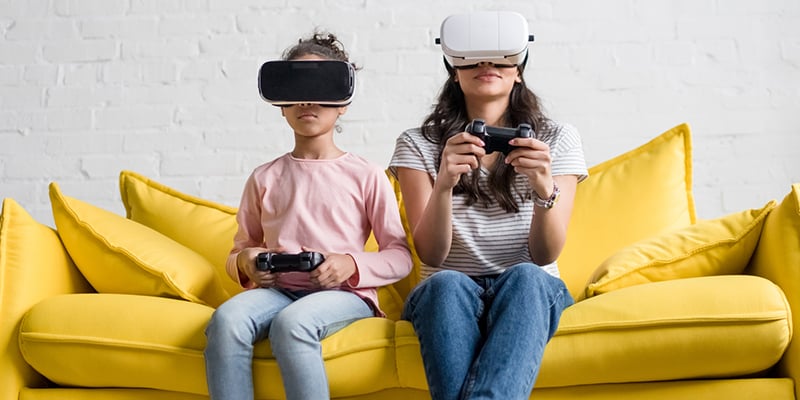
Does your child get irritable and upset if they don’t get their Fortnite fix? Are you worried they might be addicted to video games? You could be right.
In a landmark 2019 decision, the World Health Organization (WHO) has declared that video game addiction is officially a mental health disorder. “Gaming disorder” has been added to the WHO’s International Classification of Diseases, putting it on a par with depression, anxiety disorders, bipolar disorder, and other mental illnesses.
Gaming Disorder Can Steal Your Life
Research shows that 97% of Americans 12 to 17 years old play video games, and as many as 23% of gamers of all ages show signs of addictive behavior. According to the WHO, these signs include impaired control over gaming and “continuation or escalation of gaming despite the occurrence of negative consequences.” And these repercussions can be seen in a person’s personal relationships, career, schoolwork, or daily life.
Gaming disorder also puts people at greater risk for other detrimental issues, including:
- Depression
- Anxiety
- ADD/ADHD
- Sleep disturbances
- Irritability
- Bad moods
- Fatigue
- Fearfulness
- Suicidal thoughts
The link between gaming and ADD/ADHD goes both ways. In addition to gaming contributing to the condition, a 2019 study shows that people who have ADD/ADHD may be at increased risk for developing a gaming addiction.
The Risk for Addiction Lies in the Brain
It’s important to understand that gaming addiction is not a character flaw or personal failure. Brain imaging studies using a technology called SPECT show that addiction is, in fact, a brain disorder. The health of your brain plays a major role in your risk for addiction—whether it’s to alcohol, drugs, or video games.
In particular, it is your brain’s self-control circuit that helps you rein in your behaviors or that drives you to addiction.
The brain’s self-control circuit includes:
- Neurotransmitters: These chemical messengers, including dopamine, drive you to pursue your passions.
- Nucleus accumbens: The pleasure and motivation center of the brain, the nucleus accumbens is one of the primary drivers of behavior.
- Deep limbic system: Housing your brain’s emotional memory centers, the deep limbic system can push you to repeat pleasurable actions and gives you motivation so you can plan and follow through on your goals.
- Prefrontal cortex (PFC): The prefrontal cortex (PFC) is responsible for impulse control and judgment and is intended to keep the brain’s drivers in check. It acts as the brain’s brake, making you think twice before doing something you might regret.
When this self-control circuit is in balance, you can be motivated, focused, goal-oriented, and have control over your gaming and other behaviors. In the addicted brain, the PFC is weakened, allowing the drive systems to take control.

Not All Gaming Addicts are the Same
Designating video game addiction as a mental health disorder is a powerful first step in encouraging people to seek treatment. But most healthcare professionals will view it as a single or simple disorder and will treat everyone the same way. This will never work because not all people with gaming addictions are the same. In fact, SPECT brain scans reveal that there are 6 types of addicts.
Type 1: Compulsive Addicts
Type 2: Impulsive Addicts
Type 3: Impulsive-Compulsive Addicts
Type 4: Sad or Emotional Addicts
Type 5: Anxious Addicts
Type 6: Temporal Lobe Addicts
Knowing your type is essential to getting the right treatment plan to help you regain control of your life.
4 Key Ways to Break Free from Addiction
The brain is the ultimate key to overcoming gaming addiction and other bad behaviors. Strengthening your PFC is one of the best ways to balance your brain’s self-control circuit. Here are 4 ways to boost your PFC.
1. Get your heart pumping.
Regular aerobic exercise boosts blood flow to the PFC and has been shown to improve focus and impulse control. Aim for 30-45 minutes a day of fast walking (walk like you are late for an important appointment.)
2. Practice saying no.
Every time you say no to extra gaming time, you train your PFC and help create new neural pathways that strengthen your control. Eventually, saying no to unhealthy gaming behavior becomes easier and can even feel automatic.
3. Eat a brain healthy diet.
Did you know that a sugar-filled junk-food diet can fuel your addiction? Getting a quick sugar rush from soda, cookies, or candy weakens the PFC and can make you more impulsive. Eating lean protein throughout the day and eliminating sugar can help stabilize blood sugar levels, which is beneficial for your PFC, moods, and impulse control.
4. Supplement your diet.
Nutritional supplements, such as omega-3 fatty acids, green tea, and Rhodiola can boost blood flow to the PFC and help you stay focused on your goals.
If you or your child is struggling with addiction to video games or any other substance, we’re here for you. At Amen Clinics, we have helped thousands of people overcome bad behaviors and improve every aspect of their life. We use brain SPECT imaging to help identify your addiction type in addition to assessing the biological, psychological, social, and spiritual factors that may be contributing to addiction. With this comprehensive evaluation, we are able to personalize treatment solutions for your needs.
Don’t let addiction steal your life. Speak to a specialist today at 888-288-9834 or schedule a visit online.





Hello
I am.looking for help for my son. He is 17 and has a horrible addiction to gaming. Last night, he was on his game after 11, which it was a school night. I unplugged the TV and he got up in my face and told me to get out of his room, he then proceeded to push me out of his room. I sat down in the chair in his and he pushed the chair over and my head hit the wall. I desperately need help. Austin is a good kid. I have told him that he needed to get a job as he has worked in the past. He refuses to get a job.
Please help!
I am a single mom and will have to ask for help to pay for the scan.
I hope to hear from you soon!
Darlene
Comment by Darlene Moyer — February 16, 2022 @ 8:22 AM
Hello Darlene, thank you for reaching out. Amen Clinics currently has 9 locations across the US (https://amenclinics.com/locations/). For more information about scheduling, pricing, financing options, and insurance, please contact our Care Coordinators: https://amenclinics.com/schedule-visit/.
Comment by Amen Clinics — February 17, 2022 @ 11:38 AM
Just desire to say your article is as amazing. The clearness in your post is just excellent and i can assume you're an expert on this subject. Fine with your permission let me to grab your RSS feed to keep updated with forthcoming post. Thanks a million and please continue the rewarding work.
Comment by vorbelutr ioperbir — November 23, 2023 @ 4:22 AM